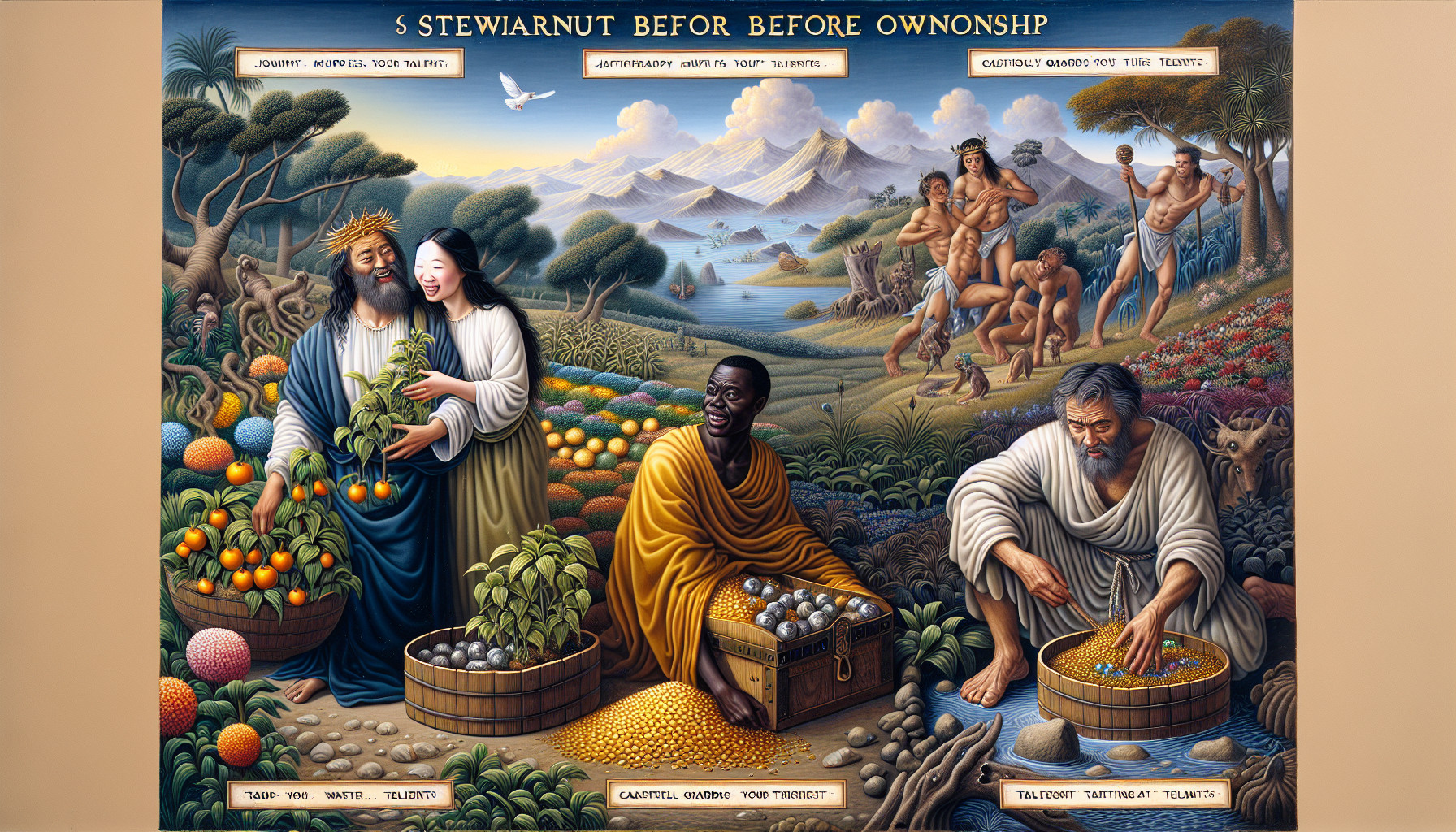In today’s episode of Divine Prosperity, we unravel the profound lesson of "Stewardship Before Ownership: Lessons from the Parable of the Talents". This biblical story is more than just an allegory—it’s a powerful lesson on the principles of financial stewardship, accountability, and responsible ownership that are as relevant today as they were two millennia ago.
Embark on a deeper exploration of these principles with us. Subscribe to additional newsletters from our trusted partners that will help you in your journey. Here is the link: Subscribe to Partner Newsletters.
Understanding Stewardship through the Parable of the Talents
In the Parable of the Talents found in Matthew 25:14-30, Jesus narrates a story about a master who entrusts his servants with his property before embarking on a journey. He gives different amounts to each servant—five talents to one, two to another, and one talent to the last—according to their abilities. The servants with five and two talents immediately put their money to work and double it. However, the servant who received one talent dug a hole and hid his master’s money.
The master is pleased with the first two servants—recognizing their efforts, he rewards them with greater responsibility. The last servant, who has hidden the talent, is rebuked for his lack of initiative and the talent is taken from him. This parable clearly illustrates the concept of stewardship: one must be responsible and productive with what they are given.
Stewardship, as explained in this parable, is about demonstrating faithfulness, wisdom, and initiative. It’s about using our resources, skills, and opportunities in a way that benefits others and glorifies God. The parable of the talents encourages us to make the most of what we’ve been given, rather than simply preserving it or hiding it away.
The Concept of Ownership in the Parable of the Talents
The parable of the talents also highlights the concept of ownership. In the story, the servants do not own the talents—they are merely stewards of the master’s resources. The talents are not theirs to own, but theirs to use wisely and productively.
This reflects a profound biblical perspective on wealth and resources: that ultimately, everything we have belongs to God. We are simply stewards of His resources, entrusted with the responsibility to use them wisely. This frame of mind changes how we view ownership—it becomes less about hoarding or using resources solely for personal gain, and more about wise management for the benefit of others and the glory of God.
In the story, the servants are judged not by how much they have, but by how well they use what they are given. The master’s commendation, "Well done, good and faithful servant," is given to those who have been responsible and productive, regardless of the amount they started with. This indicates that ownership in the biblical sense is more about responsible stewardship than accumulation.
Lessons on Responsibility and Accountability from the Parable
Responsibility and accountability are intrinsic to the understanding of stewardship and ownership as presented in the parable of the talents. Each servant was given talents according to their abilities, indicating that responsibility is proportional to capability.
The servants who invested their talents acted responsibly—they grasped the opportunity and capitalized on it. On the other hand, the servant who hid his talent displayed a lack of responsibility. He chose the path of least risk, which resulted in no growth or profit.
The parable also emphasizes accountability. Upon the master’s return, each servant is held accountable for what they did with their talents. The two servants who doubled their talents are praised and rewarded, while the one who did nothing is rebuked and punished. This underscores that we are accountable for how we use what we’ve been entrusted with.
Applying the Stewardship Principle in Everyday Life
The principles of stewardship, ownership, responsibility, and accountability, as illustrated in the parable of the talents, can be applied in our everyday lives. We are all stewards of the resources, opportunities, and abilities given to us.
In our personal finances, for example, we can practice stewardship by budgeting wisely, saving consistently, and investing thoughtfully. This requires discipline, wisdom, and a long-term perspective. It is not about accumulating wealth for our own sake, but about using our resources in a way that benefits others and glorifies God.
In our jobs, we can be responsible stewards by working diligently, continually improving our skills, and contributing positively to our team or organization. This means treating our jobs not just as a means to an end, but as an opportunity to serve others and make a difference.
In conclusion, the parable of the talents offers timeless wisdom on stewardship and ownership. It challenges us to view our resources, opportunities, and abilities not merely as things to be owned, but as gifts to be used wisely, productively, and responsibly.

Leave a Reply